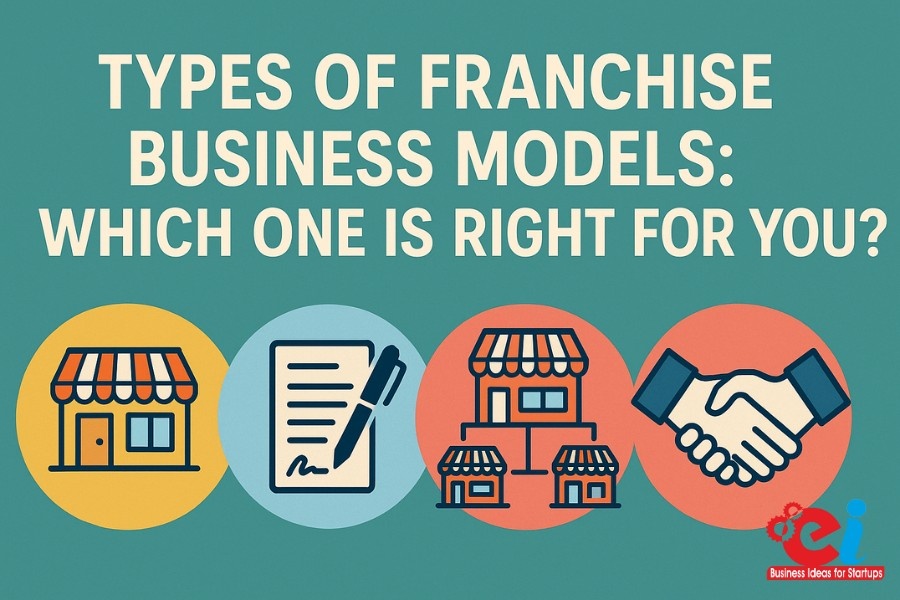Franchising is one of the more straightforward and rewarding ways to venture into business. Rather than striking out on your own, you can take advantage of an existing system, enjoy the benefits of a recognized brand, and receive continual assistance. If you dream of owning a health club, a daycare center, or running your own coffee shop, a franchise can help you achieve your vision.However, the reality is that not all franchises are the same. There are some that will require your personal attention daily and others that provide a more hands-off investment approach.
Learning about the various types of Franchise Business models is important before making any commitments.That said, we will guide you through some of the most popular Franchise Business, provide detailed descriptions of how each one functions, and point you to the most suitable model based on your experience, investment, and preferred business approach.
Comprehending the Franchise Model
In simple terms, a franchise system is an entrepreneurial model where one party, the franchisor, allows another party, the franchisee, to exploit the franchisor’s assets such as the business’s intellectual property, know-how, and trademarks. In most cases, the franchisee pays an upfront fee along with continuous royalties, which are calculated based on revenue or profit.
It is akin to purchasing a going concern with a background. An intricate and developed trade like purchasing a franchise which includes an already established brand name and logo, Relationship with suppliers, Customers who trust the brand, and Advertising frameworks, among many others. Depending on the model selected, franchises have varying levels of participation obligations that range from complete operational management to passive investment.
The model selected dictates the extent of involvement and the role played within the franchise agreement.
The 7 Most Popular Types of Franchises
These are the 7 kinds of franchises that exist in modern age business that are most prevalent. Each is unique in its own way with respect to features, investment, and operational requirements.
1. Product Distribution Franchise
This model focuses extremely on the marketing and selling of the franchisors goods. The trademarked products are sold by the franchisee. On the other hand, autonomy is afforded in comparison with other franchises. Less extensive operation systems are offered, and the only provided rights are to the brand and product.
Examples would include the bottlers of Coca-Cola and Ford and Toyota dealerships.
Best suited for: Experienced entrepreneurs with pre existing retail or distribution contacts and inexhaustable retail supply access.
Key Factors in Concentration: Giving’s access to the retailer or end user and dominion over huge stocks of inventory.
2. Business Format Franchise
Running a mc donalds franchise or a subways store are bus ness frnachise models. This is the most recognized and used type of franchise business format franchise as it aggregates all the subsidiaries of the franchisor including: branding, marketing, supply chain, training and operations.
Best for: Resources individuals and new business owners who require high level guidance from a franchisor.
Key Points: You must follow the brand’s operating instructions to the last detail. While attaining operation, advertising, and a franchise, you undergo stipulated set of procedures which significantly reduces your discretion on how to manage the outlet.
Related: 20 Best Profitable Business Ideas in India for 2025: A Comprehensive Guide
3. Manufacturing Franchise
These types of franchise business grant the franchisor the authority to use their marks, formulas and techniques and distribute goods under a specific brand and trademarks. This category is most commonly associated with food and beverages, clothing, and appliances.
Examples: Pepsi’s licensed bottlers, clothing or shoe manufacturing licensees.
Best suited for: People who have available facilities and wish to produce goods in mass.
Key points: This type of franchise is considered the most associated with substantial capital expenditure, a franchise with strong adherence to rules, and quality control systems.
4. Job Franchise
This is a managed model of low capitalization where the franchisee works mostly from home or a small local office. This is common in service businesses like cleaning, tutoring, IT services, and digital marketing.
Examples: Coaching centers operated from home, digital marketing freelance franchises, pest control businesses.
Best suited for: New entrants into franchising, small business owners, freelancers, and solopreneurs with limited funds and looking to expand.
Key Considerations: The model is heavily operator-dependent, and most tasks can be performed by the owner. However, there is added appeal in terms of rapidly recapturing the investment made with minimum risk while still providing optimal flexibility.
5. Investment Franchise
In an investment franchise, the franchise business puts up the funds, but is not actively involved in the day-to-day business. Instead, a combination of hired managers and other operational staff run the business, while the franchisee defines the overall direction or stays completely hands-off.
Examples: Large hotel franchises, cinema franchises, fast food franchises with several locations.
Highly appropriate for: Business consortia, affluent individuals, or investors with diversified investment portfolios and wishes to expand.
Key Factors: Huge funds and a superior managerial team are essential. But these are ideal when wanting to earn returns with no direct management of daily operations.
6. Conversion Franchise
A conversion franchise permits the integration of independent businesses into a greater franchise conglomerate. The franchised business retains ownership of the physical store and business but uses the franchisor’s name, marketing systems, and products.
For example: Local real estate firms converting into national chains, and independent auto service centers joining branded service networks are common sights.
Best suited for: This type of franchise is most suitable for looking for brand reputation, operational assistance, and a broader market of clientele.
Key Considerations: This is an excellent option for rapid scaling, however, adopting a franchisor’s standards is often accompanied by operational and cultural adjustments.
7. Master Franchise Or Area Developer
A master franchisee has the full authority to operate a brand’s franchise within a certain broad area territory. The most common being entire regions or countries. They can open their own units and even provide sub-franchisees that they manage.
For example: National/Regional franchise operators with several units from an internationally recognized store chain are great examples.
Most suitable for: This position is great for seasoned entrepreneurs, investment firms, or anyone with massive funds who desire long term expansion plans.
Key Considerations: This model offers most potential for earning, but great management, infrastructure, and strategic planning skills are necessary.
Choosing The Ideal Franchise Model For Yourself
Your perfect franchise model goes beyond just finances. Think of your personal goals, daily involvement, appetite for risk, and business savvy. Here are five basic elements to consider:
1. Capital Expenditure
- Low investment (₹ 1 – 5 Lakh): Small service oriented or job franchises.
- Medium investment (₹10 – 50 Lakh): Cafes, education services, and some fitness chains fall under business format franchises.
- High investment (1 crore and above): Range from investment, manufacturing franchises, or even master franchise models.
2. Time and Role Engagement
- Want to actively do something every day? Go for a job franchise or business format.
- Want to have passive investment? Go for investment or master franchises.
3. Previous Industry Experience
- New entrepreneur? Consider a training and support business format franchise.
- Do you have experience in production or operations? A conversion or manufacturing franchise might be for you.
4. Plans of Expanding
- Need to expand decisively fast? Consider going for conversion or master franchise.
- Seek static and predictable? Business format franchises provide controlled growth, so you’ll be just fine.
5. Risk Acceptability
- Prefer low risk? Go for job and business format franchises, as they are less volatile.
- Will accept significant risk for higher reward? Risky master franchises and some manufacturing ones offer high potential vs. risk scenarios.
Related: Top 10 Profitable Franchise Business in India
Franchising Trends of the Future in 2025 and Beyond
Due to shifting customer and market dynamics, franchising is continuously changing. The following are some trends that are reshaping the future:
- Digital Edtech Wellness and virtual services are booming because of the uptake of digital technology.
- Cloud Kitchens: Restaurants that accept delivery only, are adopting a cloud kitchen strategy.
- Sustainability Brands are becoming mainstream: There is a rise in eco-friendly franchise businesses.
- Expansion in Tier 2 and Tier 3 Cities: Urbanization is making these regions wealthier, unlocking opportunities for franchises.
All of these trends put together focus on giving the next generation of entrepreneurs the ability to pursue their goals using modern values that are socially responsible.
How NPCS Can Help You Grow Your Franchise
Niir Project Consultancy Services (NPCS) is all about helping entrepreneurs make the best-informed decision. Our services encompass:
• detailed franchise project feasibility reports
• customized franchise business plans
• Market research and ROI analysis for specific industries
• Regulatory approval assistance and regulatory compliance
We support entrepreneurs of every stage—whether your first franchise or growing in new markets.
Let’s turn your franchise concept into a profitable business—step by step.

















